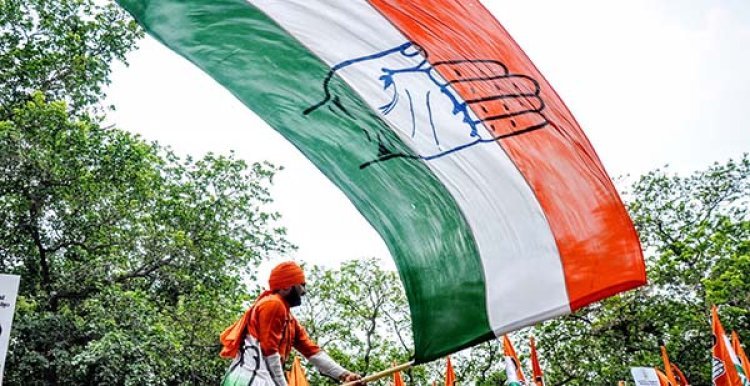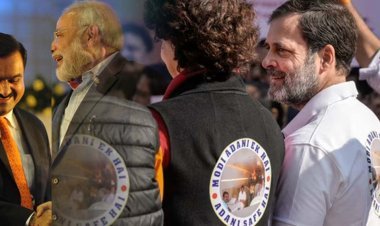Congress finally has MSP mudda against Modi. But 2 more steps to go for it to work in 2024
Legal guarantee of MSP as per Swaminathan Commission formula tops the farmers' list of demands. The Congress has aligned itself with an ongoing and powerful struggle on the ground.

By Yogendra Yadav :
The outcome of the 2024 Lok Sabha election and arguably the fate of our Republic hangs on this one question: Modi or mudda? So far, we have heard only Modi or pseudo issues like the Mandir inauguration that are an echo of Modi. Finally, one mudda has entered the electoral arena.
This happened in Ambikapur, a small and remote town in Chhattisgarh, during the Bharat Jodo Nyay Yatra. Congress president Mallikarjun Kharge and yatra leader Rahul Gandhi chose a public rally here to make the first major announcement in the run-up to the Lok Sabha election: if elected, the Congress commits to legal guarantee of Minimum Support Price (MSP) to all the farmers as per the Swaminathan Commission formula.
The significance of this announcement was not lost on any political observer. This stance represents a major departure from the policy stand taken by the Congress party, not just during its time in power but also from its election manifesto of 2019, when it was in opposition. Anticipated in the Raipur resolution of 2022, this was the first serious and substantive commitment to a long-standing demand of the farmers’ movement.
For the farmers’ movement, this is a major landmark, as it is the first time a major national party has embraced all three key elements of their primary demand. One, the present method of determining MSP should be changed in favour of the “Swaminathan formula”, whereby the MSP is fixed at comprehensive cost (C2 cost as per the agriculture ministry’s terminology) plus 50 per cent. Two, this should become a legal right and not remain another scheme whose implementation depends on the will of the government of the day and its officials. And, three, this right should be available to all farmers, not limited to those cultivating the 23 crops currently covered under MSP announcements.
The timing couldn’t have been better. After two years of relative silence, farmers are back on the streets. Both platforms of SKM have called for action. The original SKM has called for Bharat Bandh on 16 February. This coalition still contains some of the largest farm unions such as Bharatiya Kisan Union (BKU) led by Joginder Singh Ugrahan and Rakesh Tikait, Karnataka Rajya Raitha Sangha, Left-affiliated Kisan Sabhas, and various Punjab and Haryana unions, including that of Balbir Singh Rajewal. The breakaway coalition, which calls itself SKM (Non-Political), is currently leading the “Dilli Chalo” agitation that has grabbed media attention.
Although both these forces have not joined hands, some operational unity cannot be ruled out, given that the SKM has come out to denounce the Haryana Police action against the protesting farmers led by SKM (Non-Political). For the present purpose, the relevant point is that both these major representatives of the Indian farmers are fighting for the same cause. Legal guarantee of Swaminathan Commission MSP tops their charter of demands. The Congress has aligned itself with an ongoing and powerful struggle on the ground.
What it means for 2024
So, do we already have a game-changer? A mudda that can take on Modi? Not quite. Not yet. As a political worker explained to me years ago: “Chunavi mudda apne aap banta nahin hai, banaya jaata hai” (The election issue doesn’t arise on its own; it is created). There are at least six conditions required to turn something into an effective electoral issue. Congress’ declaration of legal guarantee of MSP has already met four of these. It has to work on the remaining two.
The first condition is that, for a significant section of voters, there has to be a real pain-point waiting for relief. Farmers don’t get remunerative prices for their crops and they know it. Every official document, including daily reports of the Agmarknet and the seasonal reports of the Commission on Agricultural Costs and Prices (CACP), confirms that a small group of farmers, for a select few crops, manage to secure what the government considers the bare minimum fair price. Except wheat and paddy, government procurement is a sham. “Fasal ka labhkari daam” (remunerative price for crops) is a cry of the farmers’ movement since the 1980s.
The second condition is that the problem should have a solution that the victims relate to. Legal guarantee of MSP fits this description perfectly. The pain-point has a policy solution that the elected government can be held responsible for. It is easy to understand and concrete enough to mobilise the farmers. The only difficulty used to be that most of the farmers had not heard about MSP. The farmers’ historic morcha against the three black laws did not achieve MSP, but it did succeed in making MSP a household word for the farmers’ families. This is not limited to big farmers with marketable surplus, but cuts across all classes. They may not understand the intricacies of MSP, but every farm activist knows that this is something they are entitled to and are denied. All farmer leaders—including those from RSS-backed Kisan Sangh—are wedded to three words: MSP, Swaminathan, and legal guarantee. The Congress declaration ticks all the three boxes.
The third condition is differentiation: the issue must be such that the other side cannot highjack it. MSP fits that as well, as the Modi government has boxed itself in a corner by vehemently rejecting this demand. What makes it worse for Prime Minister Narendra Modi is that this issue exposes his hypocrisy. After all, as Gujarat chief minister, he was the one to spearhead the demand for “legal status to MSP”. Farmers’ movement has not forgotten this. The government’s inaction on MSP even two years after the conclusion of the farmers’ protest in 2022 leaves it with no excuse.
The fourth condition is appropriate timing. As explained above, for once, the Congress has got its political timing just right. It’s less than two months before the election, too late for the government to make amends, and not too early for the voters’ recall during the campaign period. The Noida-based “notional media” has been forced to take note of the farmers’ woes. MSP is in the headlines again, just before the national election campaign is set to kick off.
Job’s not done yet
That still leaves two more vital conditions: public communication and political campaign. The Congress declaration has not yet reached even the farmer activists, let alone an ordinary farmer. Mainstream media may have been forced to play out the images of farmers’ confrontation with the police, but it is not going to mention the Congress’ declaration. The Congress has to find ways past this media blockade to reach out to the farmers. And it must do so without wasting much of its energies on meeting cynical policy objections.
You can trust the government to deploy its friendly “economists” to pour scorn on this declaration supported by the usual canard. The government has already circulated an off-record note to claim that legal guarantee of MSP is not feasible, that it would empty the government’s coffers. These are plain lies. My colleague Kiran Vissa and I have refuted these claims in these columns. Our colleague Kavitha Kuruganti has shown how MSP guarantee can be given effect.
The simple point worth reiterating is that an MSP guarantee does not require the government to procure all the stock of all the agricultural produce, that it can be achieved with an intelligent combination of expanded procurement, market intervention, and deficit payment. Yes, it would cost a significant amount (though not the ridiculous figures being bandied about), but spending about one per cent of GDP for farmers is a matter of political priority and an investment into the future of the country.
Finally, this has to be matched by political mobilisation and campaigning. The Congress faces an issue here, as it has not worked vigorously among the farmers for a long time. It would take some effort to get the farmers’ organisations to look to the Congress as their natural ally. Besides, the Congress has to get its INDIA partners with it on this issue. In principle, it should not be difficult, given the natural inclination of parties like SP, RJD, and NCP. But this must not get entangled into a political game of one-upmanship. Once the entire INDIA coalition is on board, the ground is ready for an electoral battle on this big issue. We don’t know if this would be a winner. But at least on issues, at last, we have a contest.

















